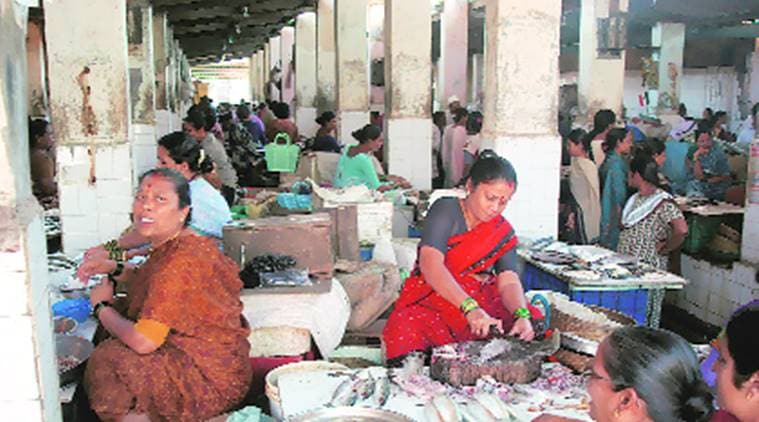 We have been managing with paper but it is useless, as it cannot hold fish and gets messy with water dripping out of it, says president of the Akhil Bharatiya Koli Mahasangha. (File photo)
We have been managing with paper but it is useless, as it cannot hold fish and gets messy with water dripping out of it, says president of the Akhil Bharatiya Koli Mahasangha. (File photo)
WITH stocks of plastic bags running out, vendors of fish and meat across the city have reported serious difficulties in conducting their business in the absence of other affordable and practical packaging material.
“After the ban on plastic was implemented, we have suffered an 80 per cent loss in our business,” said Naina Patil, president of the Akhil Bharatiya Koli Mahasangha, an association of fisherfolk. “We have been managing with paper but it is useless, as it cannot hold fish and gets very messy with water dripping out of it. We sell in the Kalina-Santa Cruz market, where there is a large Christian population. Generally after Easter, when the period of fasting for Christians is over, business sees a strong surge. But this time nobody is coming to buy fish due to this inconvenience.
BMC has told us to stop using plastic bags or else they will cancel our licence. We will write to them soon and are also planning a protest,” she added.
While the fish sellers say they are not opposed to the ban, they said they want the government to provide them an alternative.
“It is important that the government implement this ban as the plastic is harmful to the environment. But they also need to provide us alternatives to plastic or paper. They need to do some research to find something suitable for our business. The thermocol boxes we use to provide as cold storage for the fish have also been banned. We can use insulated boxes but they are very expensive. The fisheries department provides subsidies for the fishing community to purchase them. This should also be extended to allied businesses like ours so that we can replace the thermocol boxes,” said Ujwala Patil, President, Mumbai Division of Maharashtra Machhimar Kruti Samiti.
Minister for Environment Ramdas Kadam said, “People earlier used to carry dabbas (steel boxes) to buy fish they can continue doing that. The mentality of the people needs to change here.”
Meanwhile, Nidhi Choudhary, Deputy Municipal Commissioner (Special), confirmed that licences can be cancelled if rules stipulated by the civic body are flouted. “Those wanting to run their business will come up with innovative ways… We are a coastal city, plastic has till date created huge damage, and now it is time we correct our mistakes,” she said, adding that in the pre-plastic era people carried fish in creel baskets. “Fish sellers can ask their customers to even get a steel vessel with a cover. We need to change our mentality first,” she said.
Fishmongers in the market are left flailing without any alternative in sight. “Some customers are coming with plastic bags but most expect us to provide them. If there are no bags they simply do not buy the fish. These are perishable goods and if nobody buys them we are the one bearing the losses,” said Noor Shaikh, a fishmonger in the Four Bungalows market.
Similar uncertainty looms over meat traders as well. Robert Perera, a chicken seller in Juhu, said, “Customers are currently coming to the shop with plastic and we are making do with our existing stock. But after a month I am not sure how we can carry on. Paper bags are not an alternative for us. Before banning it they should have thought of alternatives for businesses like ours.”
Sumi Raote, a customer at Perera’s shop, said, “We also can carry plastic bags to the meat shop only until our stock lasts at home. Bags used for meat or fish purchase are not reusable and they have to be disposed after one use.” The home delivery business for these traders is also badly affected.
“We are currently delivering chicken in double or triple paper wrapping. But it is next to impossible as we have to deliver to several houses and the paper gets stuck to the chicken, damaging it. It is also more expensive than plastic, adding to our expenses.Our business has dropped by 40 percent after the ban,” said Mohamed Gaus, a chicken seller in Amboli.